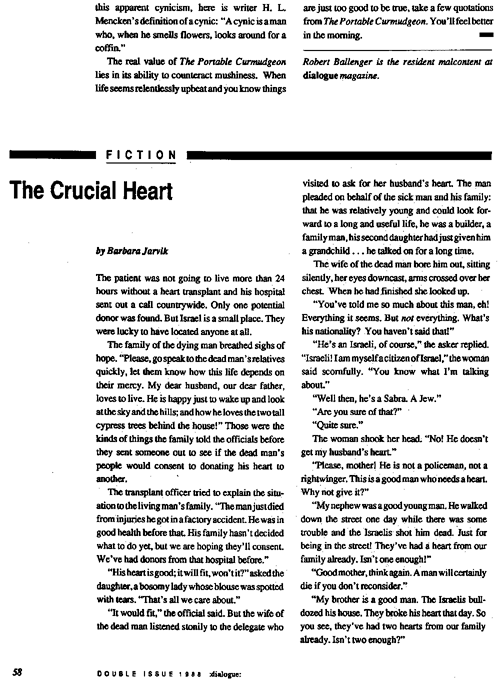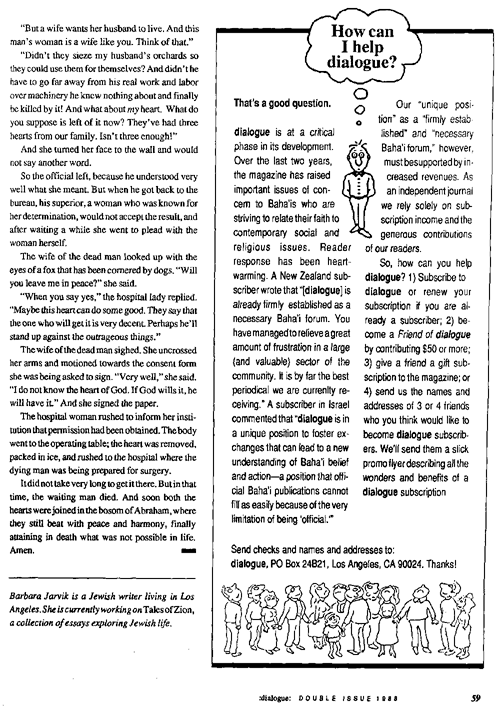
|
|
Abstract: Short story about religious tolerance in Israel. Notes: See also list of dialogue articles or image scans. |
The family of the dying man breathed sighs of hope, “Please, go speak to the dead man’s relatives quickly, let them know how this life depends on their mercy. My dear husband, our dear father, loves to live. He is happy just to wake up and look at the sky and the hills; and how he loves the two tall cypress trees behind the house!” Those were the kinds of things the family told the officials before they sent someone out to see if the dead man’s people would consent to donating his heart to another.
The transplant officer tried to explain the situation to the living man’s family. “The man just died from injuries he got in a factory accident. He was in good health before that. His family hasn’t decided what to do yet, but we are hoping they’ll consent. We’ve had donors from that hospital before.”
“His heart is good; it will fit, won’t it?” asked the daughter, a bosomy lady whose blouse was spotted with tears. “That’s all we care about.”
“It would fit,” the official said. But the wife of the dead man listened stonily to the delegate who visited to ask for her husband’s heart. The man pleaded on behalf of the sick man and his family: that he was relatively young and could look forward to a long and useful life, he was a builder, a family man, his second daughter had just given him a grandchild…he talked on for a long time.
The wife of the dead man bore him out, sitting silently, her eyes downcast, arms crossed over her chest. When he had finished she looked up.
“You’ve told me so much about this man, eh! Everything it seems. But not everything. What’s his nationality? You haven’t said that!”
“He’s an Israeli, of course,” the asker replied.
“Israeli! I am myself a citizen of Israel,” the woman said scornfully. “You know what I’m talking about.”
“Well then, he’s a Sabra. A Jew.”
“Are you sure of that?”
“Quite sure.”
The woman shook her head. “No! he doesn’t get my husband’s heart.”
“Please, mother! He is not a policeman, not a rightwinger. This is a good man who needs a heart. why not give it?”
“My nephew was a good young man. He walked down the street one day while there was some trouble and the Israelis shot him dead. Just for being in the street! They’ve had a heart from our family already. Isn’t one enough!”
“Good mother, think again. A man will certainly die if you don’t reconsider.”
“My brother is a good man. The Israelis bull-dozed his house. They broke his heart that day. So you see, they’ve had two hearts from our family already. Isn’t two enough?”
“But a wife wants her husband to live. And this man’s woman is a wife like you. Think of that.”
“Didn’t they seize my husband’s orchards so they could use them for themselves? And didn’t he have to go far away from his real work and labor over machinery he knew nothing about and finally be killed by it! And what about my heart. what do you suppose is left of it now? They’ve had three hearts from our family. Isn’t three enough?”
And she turned her face to the wall and would not say another word.
So the official left, because he understood very well what she meant. But when he got back to the bureau, his superior, a woman who was known for her determination, would not accept the result, and after waiting a while she went to plead with the woman herself.
The wife of the dead man looked up with the eyes of a fox that has been cornered by dogs. “Will you leave me in peace?” she said.
“When you say yes,” the hospital lady replied. “Maybe this heart can do some good. They say that the one who will get it is very decent. Perhaps he’ll stand up against the outrageous things.”
The wife of the dead man sighed. She uncrossed her arms and motioned towards the consent form she was being asked to sign. “Very well,” she said. “I do not know the heart of God. If God wills it, he will have it.” And she signed the paper.
The hospital woman rushed to inform her institution that permission had been obtained. The body went to the operating table; the heart was removed, packed in ice, and rushed to the hospital where the dying man was being prepared for surgery.
It did not take very long to get it there. But in that time, the waiting man died. And soon both the hearts were joined in the bosom of Abraham, where they still beat with peace and harmony, finally attaining in death what was not possible in life. Amen.
Barbara Jarvik is a Jewish writer living in Los Angeles. She is currently working on Tales of Zion, a collection of essays exploring Jewish life.
 click for larger image |
 click for larger image |
|
|